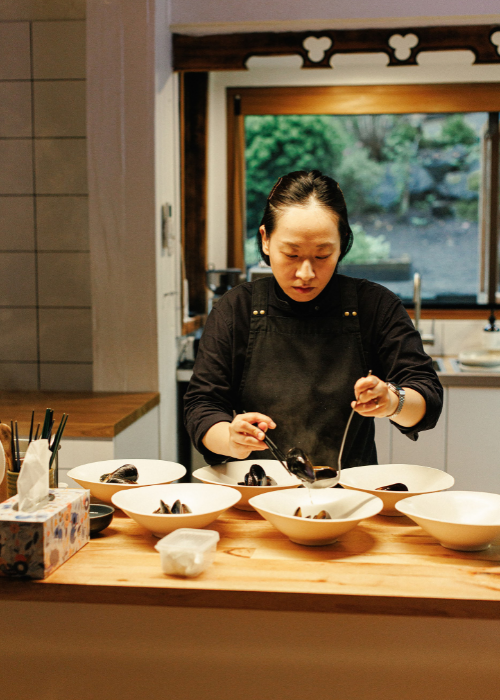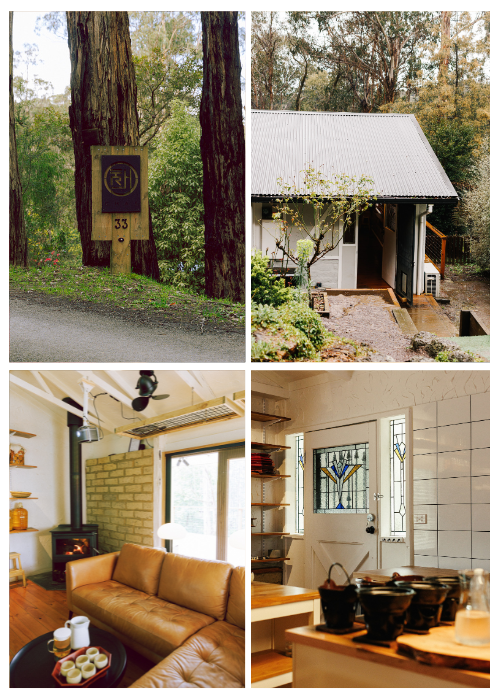- 한국어
- English
- 日本語
- 中文
- العربية
- Español
- Français
- Deutsch
- Pусский
- Tiếng Việt
- Indonesian
By Honorary Reporter Ayushi Kharayat from India
Chef Chae Jung-eun, who runs the restaurant Chae near Melbourne, Australia, offers Korean cuisine through her dishes featuring homemade jang (fermented sauces) with bold flavors.
Earning awards like Gourmet Traveller's 2022 Best New Talent and the 2025 Oceania Cruises Chef of the Year, she released this year "Chae: Korean Slow Food for a Better Life," a cookbook for jang, blending Korean fermentation methods with Australian produce.
In email interviews from Dec. 4-16, Chae discussed her culinary philosophy and role in preserving Korea's rich food traditions while adapting them to Australia. The following are excerpts from the interview.

Chef Chae Jung-eun runs Chae, a six-seat Korean bistro near Melbourne, Australia (Chip Mooney)
What inspired you to pursue a culinary career?
I grew up in Korea, where the fast-paced and highly competitive culture left me searching for a different path. As an industrial design major at university, I didn't feel passionate about my studies or see a clear career path. In the early 2000s, many of my friends traveled overseas to explore foreign lifestyles and broaden their perspectives. Following the trend, I moved to Australia to study something entirely new: pastries. I later transitioned to commercial cookery, which led to my first steps toward the food business.
What has influenced your cooking and operation of your bistro?
My principles involve creating organic and healthy food that reflects my cultural roots. Growing up in Jeollanam-do Province, known for its rich culinary heritage, deeply influenced my approach. The region's proximity to the sea makes salted seafood and preserved ingredients essential, and I often helped my mother make jang and ferment it in onggi (earthenware jars). This early exposure to Korea's traditional cooking and fermentation techniques remains the foundation of my work.

Chae has just six seats to offer a more personalized dining experience. (Chip Mooney)
How have Australians responded to Chae?
The Australian audience has responded positively to Chae, appreciating the years of preparation behind the traditional Korean flavors we serve. The intimate one-table dining experience also appeals to guests seeking tranquility and a break from their busy lives.
What sets it apart in authenticity?
We make our own jang, key condiments in Korean cuisine. We import traditional onggi from Korea and use significant space and resources to fermenting jang, a practice that many restaurants, even in Korea, find impractical. As a small home-based restaurant, we focus on authenticity by investing in these traditional methods, offering a personal experience where guests connect not just with the food, but our culture and story.
Explain your creation of jang and emphasis on fermentation and jang in your food.
Fermentation is central to my dishes, and much of my knowledge comes from learning from my mom. The process starts with making maeju (fermented soybean lumps), followed by creating condiments like doenjang (fermented soybean paste), gochujang (fermented chili paste) and soy sauce. I emphasize fermentation and jang because they form the foundation of authentic Korean cooking and add depth and richness to my dishes.

Chef Chae Eun-jung uses traditional methods to produce large batches of fermented condiments. (Chip Mooney and Chae)
Jang-making culture was just named a UNESCO Intangible Cultural Heritage. How do you feel about preserving and promoting this tradition in Australia and the world?
As a Korean chef, I feel immense pride and gratitude to see jang-making recognized as an Intangible Cultural Heritage by UNESCO. This elevates the status of our culinary heritage as a tradition worthy of global appreciation and preservation. I feel a profound privilege to help preserve and promote this heritage through my work.
What are your plans for Chae and your cooking?
I envision Chae continuing as a small and intimate dining experience; it's what sets us apart. I produce small batches of these condiments for our guests, but my long-term vision is to scale this up. We aim to launch a small production facility to create larger batches of our authentic jang and eventually go retail. This will allow us to share Korea's culinary traditions both in Australia and globally, while staying true to the authenticity of the ingredients and processes we use.
*This article is written by a Korea.net Honorary Reporter. Our group of Honorary Reporters are from all around the world, and they share with Korea.net their love and passion for all things Korean.